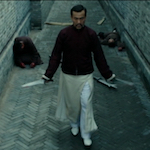 THE FINAL MASTER (2015) is the third movie from writer/director Xu Haofeng, again based on his own novel. I remember seeing a trailer for this and thinking about going to see it – man, I blew it, I could have had these great movies in my life years ago!
THE FINAL MASTER (2015) is the third movie from writer/director Xu Haofeng, again based on his own novel. I remember seeing a trailer for this and thinking about going to see it – man, I blew it, I could have had these great movies in my life years ago!
This one continues the stylistic and historical progression from THE SWORD IDENTITY (Ming Dynasty) and JUDGE ARCHER (1920s), taking place in the city of Tianjin starting in 1932. It explores some of the same themes of fighters navigating the staid traditions of martial arts to make sure their preferred styles can be passed on to the next generation – aging men trying to secure their legacies and young men trying to prove themselves. This one involves the last Wing Chun Grandmaster Chen (Liao Fan, BLACK COAL, THIN ICE) striking a deal with ready-to-retire Grandmaster Zheng (Chin Shi-chieh, REIGN OF ASSASSINS, THE GUILLOTINES, THE GRANDMASTER) to help him set up a school in Tianjin.
Zheng explains the extremely convoluted politics of the situation. Chen would have to win challenges against all eight schools to have permission to open his own school. Then he would have to defeat a champion chosen from between all the schools. Since he’s not local, they would never accept a loss to him and would run him out of town if he won. So instead he’ll have to take on a local fighter as an apprentice and train him enough to win. And they’ll run that poor kid out of town too, but at least Chen will be allowed to stay and open his school.
And there’s more! Zheng says that he himself will be chosen as the champion who the apprentice will have to fight. He’ll retire after that and doesn’t want to be completely humiliated in his final duel, so as part of the deal Chen has to teach him his knife fighting techniques.
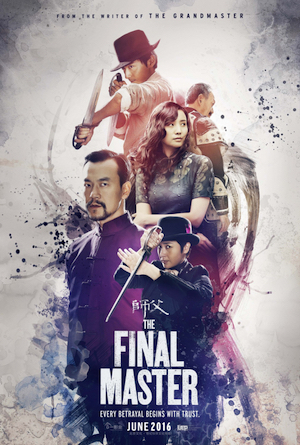 With all the training this is gonna take three years, and it’s even more complicated than that. Chen (who comes from a rich family) will have to live in poverty in a slum in order for the masters to trust him. He convinces Zhao (Song Jia, RED CLIFF, THE BODYGUARD), who works as a waitress at a fancy restaurant, to marry him. She doesn’t seem to like him, but accepts his proposition for societal reasons, since she’s considered disgraced after having had a not-fully-Chinese baby as a teenager. There is some old fashioned romance in here and while I can’t relate to these type of arrangements and definitely turned on Chen in a scene where he angrily pushes her to the ground using Wing Chun moves, she’s a really strong character and there’s some real chemistry between them.
With all the training this is gonna take three years, and it’s even more complicated than that. Chen (who comes from a rich family) will have to live in poverty in a slum in order for the masters to trust him. He convinces Zhao (Song Jia, RED CLIFF, THE BODYGUARD), who works as a waitress at a fancy restaurant, to marry him. She doesn’t seem to like him, but accepts his proposition for societal reasons, since she’s considered disgraced after having had a not-fully-Chinese baby as a teenager. There is some old fashioned romance in here and while I can’t relate to these type of arrangements and definitely turned on Chen in a scene where he angrily pushes her to the ground using Wing Chun moves, she’s a really strong character and there’s some real chemistry between them.
The apprentice ends up being Geng Liangchen (Song Yang, who played the one with the sword in THE SWORD IDENTITY and Judge Archer in JUDGE ARCHER), who Chen chooses after defeating him in a duel. The doofus saw Zhao on the street, thought she was hot, and decided to follow her home to challenge her husband. He works as a coolie (rickshaw driver) but Chen commands him to conserve his energy for training, so he starts to only use his cart to sell books, creating an ongoing conflict with the other coolies.
There are alot of different motives and manipulations going on here, but if there’s a villain it’s a crime boss named Madame Zou (Jiang Wenli, FAREWELL MY CONCUBINE) who seems to run all the schools. She dresses in traditionally male clothes, has short hair, and either implies or feigns attraction to Zhao, so this could definitely qualify as a negative lesbian stereotype. But also she’s not entirely evil and she’s a widow, so I like the idea that since her husband’s death she’s been living her best life.
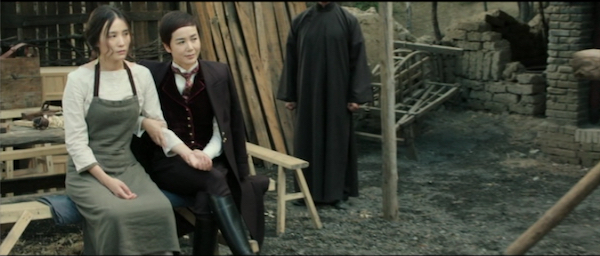
Though this retains the SWORD IDENTITY rule of having to defeat all the local schools in challenges for the right to open a new school, it’s a more modern world with much more international influence. Lots of western style clothing, lots of white people walking around, people meeting over coffee. Zhao has a photo of Rudolph Valentino on her mirror, she later says she prays to him as a god, and then reveals that she likes him because he reminds her of the white man who impregnated her when she was 17. She likes going to a French cafe and ordering croissants. She has a cigarette holder ring that turns out to be left behind by her deadbeat Valentino. Maybe we need to rethink the meaning of her always having a cig burning on it when she makes love to Chen.
There’s also a radio and a Steinway organ, which goes hand in hand with a movie projector. A duel is filmed in order to humiliate Zheng by showing (misleading) evidence of his defeat when all the masters are gathered to watch a movie. I like the idea of a screening series for kung fu masters! Their selection is a Chinese serial called THE BURNING OF THE RED LOTUS TEMPLE. It really existed but has been lost, so Haofeng has fun shooting some scenes in a retro style.
Many Chinese and Hong Kong films have humor in them that’s too broad for me, but Xu’s is always very wry. There’s some really funny dialogue, and no mugging. There’s still a serious conversation going on in a scene where Chen attempts the ridiculous feat of eating eight loaves of free bread at a restaurant to prove himself to Zheng. Another good one is when the masters want to bring Geng for a feast at a fancy restaurant to celebrate his first victory, but he’s not interested, so they say “You can choose the place” and they end up all uncomfortably sitting at a rickety wooden table by a tea cart operated by Geng’s elfen-looking crush (Madina Memet, KUNG FU LEAGUE).
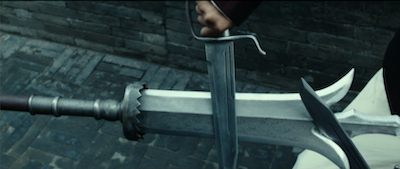 The action is plentiful, varied, and excellent. Most of it is weapons oriented – lots of blades with special hilts and angles on them to catch onto and slide against their opponents’ blades. Weapons listed just in the character names on the end credits include curved knives, broadsword, tomahawk, dagger, halberds, and sword. (Each of those have a bunch of fighters listed.) There are different interesting locations for the fights, from a coffee shop to a narrow stone alley. There’s some cool training on spinning, spring-loaded contraptions covered in poles or swords.
The action is plentiful, varied, and excellent. Most of it is weapons oriented – lots of blades with special hilts and angles on them to catch onto and slide against their opponents’ blades. Weapons listed just in the character names on the end credits include curved knives, broadsword, tomahawk, dagger, halberds, and sword. (Each of those have a bunch of fighters listed.) There are different interesting locations for the fights, from a coffee shop to a narrow stone alley. There’s some cool training on spinning, spring-loaded contraptions covered in poles or swords.
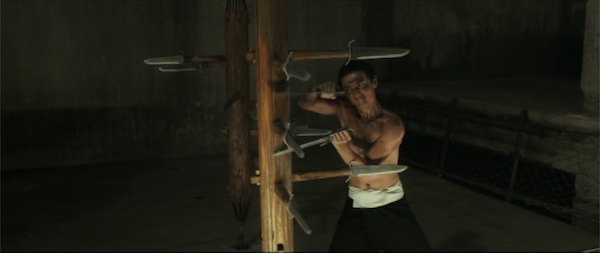
As always in Xu’s movies the sound effects are very important, and like JUDGE ARCHER it has a cool and unique score by An Wei, using mostly trumpet, feedbacky guitar and a violin.
Also like JUDGE ARCHER it has a really captivating plot that eventually leaves me a little lost but ends on a high note. I really love these stories, even when they get convoluted, but it’s the accumulation of great scenes and little details that make Xu a unique voice. I love that in both the opening and closing challenges Chen fights wearing shiny white dress shoes. One of Geng’s duels is against a woman kicker who fights in heels. I love that Brother Zheng brings him to see a Belarusian dance performance to show him that the precision of the movements reminds him of martial arts. (I thought he was gonna come up with some kind of way to apply that, but his interest in these leggy young women turns out to be the more obvious one.) I love that Geng’s tea cart lady seems from her dress to be from some nomadic culture (what THE SWORD IDENTITY’s subtitles called “gypsies” but I don’t know a better name) and when she sees that Geng is wounded she pulls out a knife, cuts off some of her own hair, sets fire to the hair on top of the blade and then uses it to seal the wound. Handy, if terrible smelling!
There are too many great scenes and sequences to count, but I think my favorite is when Zhao’s purse gets stolen by a little street kid. She chases the kid into an alley, where he gives the purse to an old man sitting on a bench, and then a bunch of shirtless young men surround her.
Suddenly Chen is there, wearing his fancy white outfit and holding a small stray dog in one hand as he takes out the first thug. He puts the dog down before beating up the others and then walking over and sitting down next to the boss, not even looking at him. The guy just tosses him the purse and runs.
But that’s only the prelude! As the old guy is leaving he talks shit, daring Chen to stick around in the alley ‘cause he’ll come back with more guys and kick his ass. “Can you bring twenty?” Chen asks.
“Sure.”
“I’ll wait,” Chen says. And he’s not joking.
So Chen sets up a bench and sits down with Zhao to wait for the guy to come back with more of his guys. She tells him that holding the dog reminded her of the baby she had as a teenager, and that although everyone believes the baby was killed he was actually sold. They have this quiet, serious talk about their pasts and what they want in their lives, and it continues as the old man returns with the 20 thugs and they start attacking. Chen remains seated at first, dispatching them with a bamboo pole, and turning back to continue the conversation after each one.
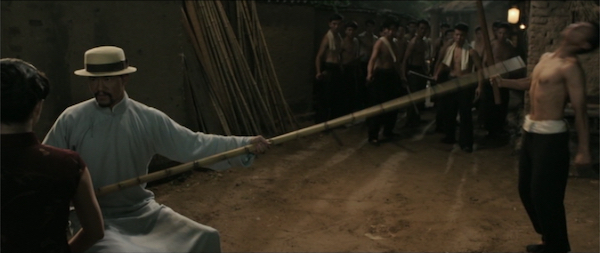
I mean, this is a great fucking movie. Moving melodrama, dry humor and great action all at the same time, somehow all enhancing each other, not detracting or distracting. Beautiful.
Xu completed a fourth film, THE HIDDEN SWORD, in 2017. Unfortunately, after playing film festivals its release was abruptly cancelled due to apparent censorship issues. Hopefully we’ll eventually be able to see that and his fifth film, SHI YAN JUAN TIAN YA, which IMDb says is in post-production. Until then I’ll have to check out MONK COMES DOWN THE MOUNTAIN (2015), a Chen Kaige movie based on one of Xu’s novels.


























April 19th, 2022 at 9:37 am
I liked this too, although, like you said, things get a little too complicated in the second half. You think it’s going to be this traditional kung fu flick where Chen eventually wins all the fights to set up his school but it becomes something very different, and interesting. The only sour note is the eventual fate of poor Geng. Dude got fucked over.